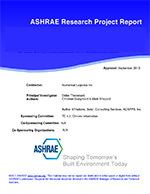States that the principal commercially-active heat storage application in which concrete is used as the storage medium is in the use of subfloor electric heaters embedded in a layer of sand. The resistance heaters are energised when off-peak rates are in effect. The sand bed and the concrete floor are then heated to a predetermined temperature and the floor releases heat slowly and remains warm during the subsequent period of high demand. Presents an analysis of the slab-heating system for varying design parameters such as the depth of the placement of the heaters, the sand properties, the energy input and the insulation thickness. Also optimises the system based on life-cycle costs. Also considers the suitability of this system for heating a warehouse in four representative cities in the USA. Finds the response of the system was greatly influenced by the depth of the placement of the heaters, the sand’s moisture content and the heating strategy. Concludes the system may be more suitable for heating maintenance and storage facilities rather than for residential and office buildings because of the difficulty of controlling the energy release from the heating mats.
KEYWORDS: USA, analysis, electric heating, floor heating, calculating, optimisation, warehouses, controls, heat flow, concrete heat storage, storage heating, off peak electricity, off peak heating, thermal insulation
Citation: ASHRAE Trans. 1994, vol.100, part 2, paper number 3784, 3-13, 10 figs, 5 tabs, refs.
Product Details
- Published:
- 1994
- File Size:
- 1 file , 1.3 MB
- Product Code(s):
- D-17361


